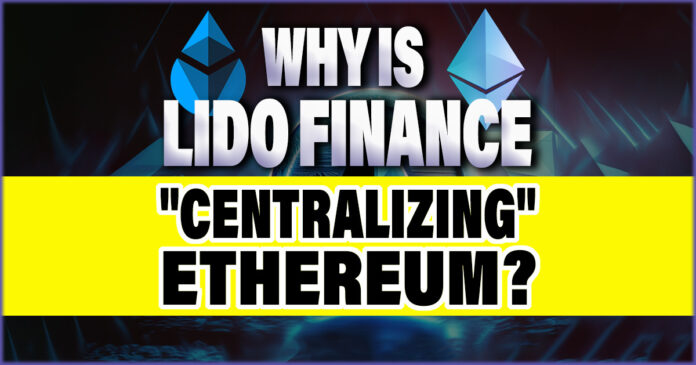Today, Lido Finance is the largest player in the Liquid Staking space. In fact, as of the end of August 2023, it accounts for 73.4% of all staked $ETH on LSD protocols. Now, with such a huge allocation, Lido Finance controls a ton of voting power over Ethereum.
This brings about certain “centralization” concerns, which we discuss below. But before we dive in deeper, let us do a quick recap on what Lido Finance is.
What Is Lido Finance?
In short, Lido is a Liquid Staking Derivative (LSD) protocol. It allows users like you and me to stake $ETH without a minimum limit. Contrast this to staking directly on Ethereum, where you need a 32 $ETH minimum stake.
In addition, staking on Lido allows you to get $stETH. This is an LSD token that represents your stake. Over time, it accrues staking rewards as well. With $stETH, you can participate in DeFi and provide liquidity. Also, you could transact your $stETH too! The recipient can then redeem the $stETH for $ETH directly with Lido.
Why Is Lido Finance “Centralizing” Ethereum?
To answer this question, let us refer to the following tweet. Here, Danny Ryan from the Ethereum Foundation voices his concerns over Lido’s voting power.
🚨🚨🚨 Danny Ryan of the Ethereum Foundation calls @LidoFinance a "corporatization, a centralization and a system threat" of Ethereum.
"What happens when a regulator realizes that 3 people control the vote? I got 3 doors to knock on, easy." 👀 pic.twitter.com/K3eDQl5SAm
— Pledditor (@Pledditor) September 26, 2023
Firstly, Danny, one of Ethereum’s Founders, feels that Lido is like a Venture Capitalist (VC)-owned “cartel”. Many projects in the crypto space are similar too. VCs are important to help jump-start a project with funding. However, Danny raises issues with VCs due to their control over LSD projects.
Secondly, Danny says that in Lido, only “3 people control the vote”. Indeed, this reflects the centralization aspect of Lido. This is dangerous for any project in crypto. As Danny clearly points out, regulators only “got 3 doors to knock on, easy”. In turn, this means that Lido can easily be shut down by authorities.
A Centralized Protocol Controlling a Decentralized Ethereum
Today, Ethereum is decentralized to a large extent. There are many validators and LSDs tokens that stake on Ethereum. However, he is not happy with Lido’s centralization. He claims that it’s akin to layering “a pretty centralized component” atop Ethereum. If Lido shuts down, it could significantly affect the finality of the Ethereum chain.
How Do We Avoid a “Disaster” Scenario?
Here, Danny believes that the issue with Lido’s centralization is not a huge issue at the moment. He believes that the situation can be managed. However, it’ll be very helpful to discuss such scenarios early on. By bringing these issues early to the table, precautions can be taken.
Nah i still take the stand
Danny is right and lido is a problem
However, his point is on 'decentralization' and MAV
If Lido control's 33%, that's an issue
Similarly if BNP pools, control 33% that's still an issue
The problem is concentration and not permissionlessness
— Juve (@notjuve) September 27, 2023
Moreover, members of the Ethereum community seem to be heeding Danny’s warnings. For sure, we all hope for a decentralized Web3 world. Ethereum is the main foundation for this. Hence, we hope that Lido’s centralization won’t cause problems down the road.
Disclaimer
The information discussed by Altcoin Buzz is not financial advice. This is for educational, entertainment, and informational purposes only. Any information or strategies are thoughts and opinions relevant to the accepted levels of risk tolerance of the writer/reviewers and their risk tolerance may be different than yours. We are not responsible for any losses that you may incur as a result of any investments directly or indirectly related to the information provided. Bitcoin and other cryptocurrencies are high-risk investments so please do your due diligence. Copyright Altcoin Buzz Pte Ltd.





























